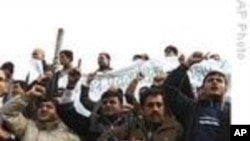Freedom of the press is vital to a free society. It protects the right to publish information and to express differing ideas in various media. To ensure a government is doing what it should, citizens need to be informed.
A nation's free press serves an investigative and informative function. If citizens do not like what they see, they can remove politicians from office and elect those they believe will do a better job.
On April 10, 2008, in a national election, the Communist Party of Nepal - Maoist, won 220 of 575 seats in the Constituent Assembly, more than any other political party. Some say the Maoists' surprise victory came about in large part because of the Nepali people's dissatisfaction with the previous ruling political parties. Observers lauded the Maoists' transition from insurgent army to political party and commended their participation in the peace process that led to elections.
Nepal has an interim constitution, Article 15 of which guarantees complete freedom from censorship in publishing, broadcasting and printing. Yet for the past few months, Maoist organizations have been waging a campaign against media outlets that criticize the government for its continued use of violence and intimidation.
Members of labor unions affiliated with the ruling party have disrupted newspaper distribution, vandalized offices, attacked office workers and threatened them with death. Recently about 50 self-described supporters of the Maoist Party broke into the office of a publisher of several periodicals. They vandalized the premises and attacked the staff, and warned them against publishing anti-Maoist stories.
The attack was condemned by journalistic and human rights groups, and governments around the world, including the United States. In a written statement, the U.S. Embassy in Katmandu called it a blatant, illegal assault on freedom of the press in Nepal. "There is no justification for the use of violence and intimidation by any party or organization in an attempt to control the media or threaten freedom of the press in Nepal."
If the people of Nepal wish to be led by a democratic government, then their media must remain free and uncensored. One cannot exist without the other.
A nation's free press serves an investigative and informative function. If citizens do not like what they see, they can remove politicians from office and elect those they believe will do a better job.
On April 10, 2008, in a national election, the Communist Party of Nepal - Maoist, won 220 of 575 seats in the Constituent Assembly, more than any other political party. Some say the Maoists' surprise victory came about in large part because of the Nepali people's dissatisfaction with the previous ruling political parties. Observers lauded the Maoists' transition from insurgent army to political party and commended their participation in the peace process that led to elections.
Nepal has an interim constitution, Article 15 of which guarantees complete freedom from censorship in publishing, broadcasting and printing. Yet for the past few months, Maoist organizations have been waging a campaign against media outlets that criticize the government for its continued use of violence and intimidation.
Members of labor unions affiliated with the ruling party have disrupted newspaper distribution, vandalized offices, attacked office workers and threatened them with death. Recently about 50 self-described supporters of the Maoist Party broke into the office of a publisher of several periodicals. They vandalized the premises and attacked the staff, and warned them against publishing anti-Maoist stories.
The attack was condemned by journalistic and human rights groups, and governments around the world, including the United States. In a written statement, the U.S. Embassy in Katmandu called it a blatant, illegal assault on freedom of the press in Nepal. "There is no justification for the use of violence and intimidation by any party or organization in an attempt to control the media or threaten freedom of the press in Nepal."
If the people of Nepal wish to be led by a democratic government, then their media must remain free and uncensored. One cannot exist without the other.




